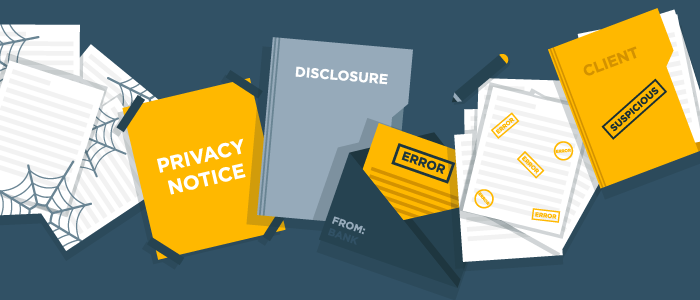Talk to Sales: (401) 200-6026
Simple errors can result in auto finance compliance slip-ups that get your dealership in big trouble. Here’s how to steer clear of these damaging situations.
As a finance manager, what would you say is the most important part of your job?
If you’re like many others in the same profession, there’s a good chance you said something to the effect of “making money.” It would be silly to say that making money isn’t important—after all, that’s why most people have jobs in the first place. But if it’s your number one priority, you may not have a job for long.
Why? Because in dealerships, auto finance compliance needs to be at the top of your list. If you’re making too many mistakes and ignoring compliance, they’re eventually going to catch up with you and you’ll be in big trouble.
Auto finance compliance mistakes you can’t afford to make
Mistake #1: You tried to finish paperwork too quickly, and it has quite a few glaring errors.
How to avoid this mistake:
This type of error is prevalent in the F&I world, and it can get you in a lot of trouble. There are a few ways, however, to avoid any auto finance compliance issues. First, slow down—just a little bit. You probably feel lots of pressure to move quickly, but if you chill out now, you may not have to correct anything later.
Second, someone in your dealership should make sure all the paperwork coming out of finance is compliant. Errors are much more likely when a deal has to get passed around multiple times, so having that final line of quality control is paramount.
Mistake #2: You avoid complete disclosure because you’re afraid the customer will back out of the deal.
How to avoid this mistake:
Don’t rely on the disclosure blocks on your contracts to fill your customers in (assuming they even read the fine print and find them). The customer has made it this far, and it’s extremely doubtful that they’re going to walk away if you disclose properly. Always be clear and upfront with your customers—you may not be delivering news they love, but they will respect you for being honest and view you as a credible person.
Mistake #3: You didn’t send the right paperwork to the bank when seeking financing for a customer, and now you have to start all over again and make the client wait.
How to avoid this mistake:
Banks usually have checklists you can use to make sure all the correct paperwork is sent their way for faster funding. Follow these checklists for help in making sure you submit the correct paperwork for every deal.
Schedule an AutoRaptor Demo Now!
Learn how AutoRaptor can turn your dealership into a lead generation machine

Mistake #4: You arranged credit or leasing for a customer and forgot to provide a privacy notice.
How to avoid this mistake:
Under The Gramm-Leach-Bliley Act, you must provide individual customers with a privacy notice. The notice is essential for showing your customers that you respect their privacy and work hard to keep their personal information protected. It’s also worth mentioning that the Federal Trade Commission (FTC) won’t be too happy if you skip this auto finance compliance rule. Make copies of the privacy notice every day and have a fresh stack sitting on your desk, so it’s impossible to forget them.
Mistake #5: Some of the documents a customer gave you look suspicious, but you’re afraid to call them out, find out you’re wrong, and lose the deal.
How to avoid this mistake:
The thought of losing a deal is frustrating to any automotive professional, but you need to trust your instincts. You’ve been in the industry for a while, and you run accounts and check documents every day—you know when something doesn’t look right. And with the FTC’s Red Flags Rule, it’s your job to detect IDs that looked altered or forged, inconsistencies in information, or a Social Security number that’s already been used by someone else.
Mistake #6: You let customer credit reports sit out on your desk for weeks—even months—after a deal has closed.
How to avoid this mistake:
One of your primary auto finance compliance duties is to securely dispose of the consumer credit reports once they’re no longer needed. Credit reports are confidential information that anyone could steal and use to commit identity theft—and if that happens, your dealership could be sued for failing to comply with the Fair Credit Reporting Act. If you don’t have a shredder in your office already, get one. You need to make it as easy as possible for to shred sensitive documents when you’re busy.
Auto finance compliance 101: Get organized
A big part of auto finance compliance is getting and staying organized. It’s ensuring confidential documents have a secure place to live, the correct documents have signatures, you have copies of licenses, and you can find anything you need at a moment’s notice. Take the time and make an effort to cross your t’s and dot your i’s and you’ll discover it’s easier to do your job and keep your dealership bosses happy.
Interested in an Affordable, Full-Featured Auto Dealer CRM?
Schedule an AutoRaptor Demo Now!







